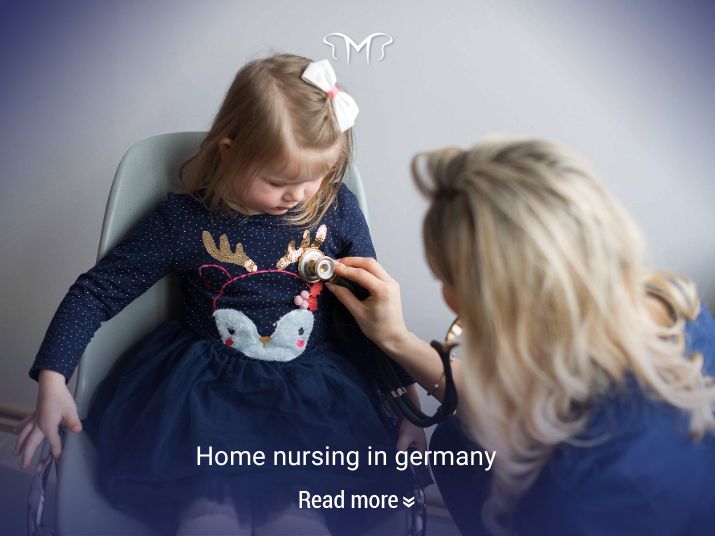
Home Nursing in Germany: From Myths to Reality
In today’s world, with an aging population and increasing demand for specialized care, home nursing has emerged as a popular and efficient solution. In Germany, these services have been rapidly expanding due to their high quality and focus on meeting individual patient needs. Home nursing in Germany represents a new approach to delivering healthcare and treatment, which has seen significant growth in recent years.
These services not only help patients continue their treatment and daily lives in the comfort of familiar surroundings but also provide families with peace of mind, reducing many of their concerns. With the rise of this caregiving model, we’ve decided to delve deeper into the subject of home nursing in Germany. If this topic interests you, stay with us till the end of this article.
What Is Home Nursing and What Services Does It Provide?
Home nursing refers to a set of healthcare and medical services provided to patients in their homes. These services are designed for the elderly, children, chronically ill patients, or individuals unable to visit healthcare facilities easily due to illness or disability. The primary goal of home nursing is to maintain patients’ quality of life by offering necessary care in a familiar and comfortable environment.
Home nursing in Germany encompasses a wide range of services. One of the most critical aspects is medical care, such as monitoring vital signs (pulse, blood pressure, temperature) and performing basic treatments like wound dressing or administering injections. Assistance with daily living activities (ADLs), such as bathing, dressing, eating, medication management, and mobility, is another integral part of the support offered.
In addition to physical care, home nursing services also focus on emotional and psychological well-being. Caregivers may engage in conversations, encourage social activities, and even provide counseling to help patients better cope with the challenges of daily life.
Why Is Home Nursing Important in Germany?
Since this article aims to explore home nursing in Germany, it’s crucial to first understand the significance of these services in the country. One of the primary reasons for its importance is Germany’s aging population. The country has one of the highest proportions of elderly people globally, significantly increasing the demand for home healthcare services.
Home nursing allows elderly individuals to live in familiar and comfortable surroundings while receiving appropriate medical and social care. On the other hand, financial pressures on the healthcare system have made it challenging for hospitals and clinics to address the needs of all patients due to limited resources and a high patient load.
Home nursing in Germany helps alleviate this burden by offering direct, high-quality care to patients. These services can also reduce healthcare costs, as staying at home is generally more affordable than hospitalization. Furthermore, private home nursing in Germany provides patients with greater independence. Many elderly individuals and chronically ill patients prefer to remain in their homes while still benefiting from necessary care, fostering a sense of independence and self-sufficiency.

Legal Requirements for Working in Home Nursing in Germany
If you are a nurse considering Germany as your migration destination, it's essential to understand the legal requirements for working in home nursing. These regulations are designed to ensure high-quality care while safeguarding both nurses and patients. Below, we outline the key requirements:
Nursing Degree and Credential Recognition
Nurses must hold a valid nursing or healthcare degree from a recognized institution, either in Germany or abroad. Non-German nurses must have their qualifications officially recognized by the relevant authorities in Germany. This process may involve additional exams or training courses.
Specialized Training Courses
Nurses are often required to complete specialized training in home nursing and advanced healthcare practices. These courses typically cover topics such as elder care at home in Germany, medication management, and communication techniques.
German Language Proficiency
Language skills, especially in German, are crucial for effective communication with patients and their families. Those seeking a career in home nursing in Germany must achieve at least a B2 level in German and provide certification to prove their proficiency.
Membership in Relevant Organizations
Nurses must register with relevant professional bodies, such as nursing associations, and comply with their rules and regulations. These organizations oversee service quality and provide ongoing education.
Work Permit
Non-EU nurses must obtain a residence and work permit to practice in Germany. This permit is issued upon presenting valid qualifications and a job offer from an employer.
Privacy Protection
One of the legal obligations for private home nurses in Germany is adherence to data protection laws (GDPR). This means personal and medical information of patients must be kept confidential and used only with their consent.
Salary and Career Prospects in Home Nursing in Germany
Income for Home Nurses
Earnings for home nurses vary depending on experience, location, and type of services provided. On average, monthly salaries range between €2,500 and €4,000. Experienced nurses with specialized skills may earn even more. Working night shifts or holidays can also increase income, as employers often offer additional compensation. Besides base salaries, nurses may enjoy benefits like health insurance, annual leave, and access to professional development programs. Performance bonuses or incentives may also be offered by some employers or families of patients.
Career Outlook in Home Nursing
With an aging population and growing demand for home healthcare services, the need for home nurses in Germany is continuously rising. This trend aligns with social and cultural shifts favoring home-based care. Nurses entering this field can provide a range of services, including general care, specialized support for chronic illnesses, and psychological services. This diversity allows nurses to specialize in specific areas of interest. Additionally, continuing education and obtaining advanced certifications, such as in care management or psychiatric nursing, can lead to career advancement and higher positions within the field.

How to Find a Job in Home Nursing in Germany?
If you are looking for a position in home nursing in Germany, there are several essential steps to follow. These steps include:
Gathering Required Documents: To migrate and work in Germany, you need a valid educational degree. If your degree is issued outside Germany, it must be certified by relevant authorities. Additionally, you will need to present a German language certificate to prove your proficiency.
Job Search: Once you have the required documents, start looking for jobs. Reliable job search websites such as Indeed, StepStone, and Jobbörse allow you to easily find job postings related to home nursing. Social media platforms like LinkedIn and Facebook can also help you discover job opportunities.
Consulting Recruitment Agencies: While you can personally search for a job, a simpler and more secure option is to use recruitment agencies. Agencies specializing in healthcare often collaborate with various employers and can connect you with relevant job opportunities.
Preparing and Submitting Your Resume and Cover Letter: Next, create a professional and precise resume that includes your education, work experience, and skills. Emphasizing home nursing experience will enhance your application. Additionally, write a strong cover letter showcasing your interest and motivation for working in this field.
Attending Interviews: Finally, prepare for job interviews. Be ready to answer questions related to nursing and healthcare and discuss your previous experience.

Differences Between Home Nursing and Hospital Work in Germany
Nurses planning to migrate to Germany may face a choice between working in home nursing or hospitals. Here are the key differences between these two areas:
Work Environment
Home nursing involves working in the patient's home, which can reduce stress for patients and create a comfortable environment for both the patient and the nurse. On the other hand, hospital nurses work in busy and high-pressure environments, with access to advanced medical equipment and multidisciplinary teams that facilitate immediate and specialized care.
Type of Services Provided
Home nursing services in Germany usually include daily care, assistance with daily activities, medication management and simple medical care, and nurses in this field pay more attention to the specific needs of patients. Such as pediatric nursing in Germany, which requires special and careful attention to children at home. This is while working in a hospital provides services such as more complex and urgent care for patients with acute conditions or specialized treatments, and nurses in a hospital usually collaborate with doctors, surgeons and other specialists to provide these services quickly and with much higher quality.
Duration of Care
Home nursing care is usually provided continuously or during specific hours, focusing on personalized services for each patient. Hospital nurses often work long shifts and may care for multiple patients simultaneously, including nights and holidays.
Level of Interaction with Patients
Home nursing allows for closer and more emotional relationships with patients, as nurses spend more time with each individual and address emotional and social needs. In hospitals, nurses have less emotional engagement and focus more on medical and therapeutic care due to higher patient volumes and workload pressures.
Challenges and Responsibilities
Home nursing challenges include managing emergencies at home and addressing diverse patient needs, whereas hospital nurses face more complex challenges, including high-stress conditions and managing acute cases. Nurses in hospitals must make quick decisions and act in critical situations.
Working Hours and Flexibility
Home nursing typically offers more flexible hours, tailored to patients' needs. Hospital work involves fixed, long, and often irregular shifts.
The Role of Home Nursing Service Providers in Germany
Home nursing service providers in Germany play a vital role in delivering healthcare to patients and are recognized as a key component of the country's healthcare system. These companies offer a variety of services, especially to elderly individuals and those with chronic illnesses. Their services include medical care, assistance with daily activities, and emotional support.
One of their primary roles is to alleviate the burden on hospitals and healthcare centers. By providing home nursing services, these companies can manage the needs of patients whose conditions are not critical, reducing hospital admission rates. This approach not only enhances the quality of life for patients but also lowers healthcare costs and improves access to specialized care for those requiring intensive support.
Another critical contribution of these companies is supplying skilled and professional caregivers. They are required to adhere to strict quality and health standards and must obtain the necessary licenses from relevant authorities. Continuous monitoring of these providers ensures service quality and patient safety.
Given the increasing demand for nurses in Germany, these companies also provide excellent employment opportunities for migrants and professionals in the field, aiding in the recruitment and retention of skilled workers. For those interested in working as home nurses in Germany, connecting with home nursing service providers is often the best choice. Such companies may assist with obtaining the certifications needed to live and work in Germany legally.
Can Home Nursing Help Obtain Permanent Residency in Germany?
Home nursing in Germany can be an effective and excellent route to permanent residency in Germany. People who intend to obtain German residency through home nursing in Germany must first obtain a valid temporary work and residence permit. This permit is usually granted to people with educational qualifications in nursing or healthcare. Also, a sufficient level of German language (usually B1 or B2) is one of the main requirements for nurses to immigrate to Germany and work in this field.
Given the increasing need for nurses in Germany, especially in the field of home nursing, the government of this country looks positively at the skilled workforce in this field. After working in Germany for a certain period of time (usually at least 2 to 3 years), nurses can apply for permanent residency. To do this, people must show that they are able to provide for themselves and their family and are also familiar with German culture and language. Because home nursing helps reduce the burden on the healthcare system and improves the quality of life of patients, this profession is recognized as a needed job in Germany and can increase people's chances of obtaining permanent residence.

Final Thoughts
Home nursing in Germany is a critical and growing sector of the healthcare system, enabling patients to access medical and supportive care in the comfort of their homes. With the aging population and rising demand for personalized services, this profession has attracted numerous new applicants worldwide.
For nurses who have recently migrated and may find working in busy hospital environments stressful, home nursing in Germany offers an excellent alternative. If you’re concerned about your future and wish to migrate as a nurse, contact Monarch Consultants today. At Monarch Migration Holdings, we provide free end-to-end support for nurse migration to Germany, guiding you from the initial application to securing a stable life in Germany.
FAQs
What services are included in home nursing in Germany?
Home nursing in Germany covers a wide range of services, including medical care (such as medication management and dressing changes), assistance with daily activities (like bathing, dressing, and meal preparation), and psychological support.
Do I need specific qualifications to work as a home nurse in Germany?
Yes, you need a valid qualification in nursing or healthcare. If your qualification is from outside Germany, you may need to get it recognized and possibly complete additional courses or language exams.
Can working in home nursing lead to permanent residency in Germany?
Yes, working in home nursing can help secure permanent residency. By holding a valid work permit and meeting the required conditions (typically 2 to 3 years of work), you can apply for permanent residency.


